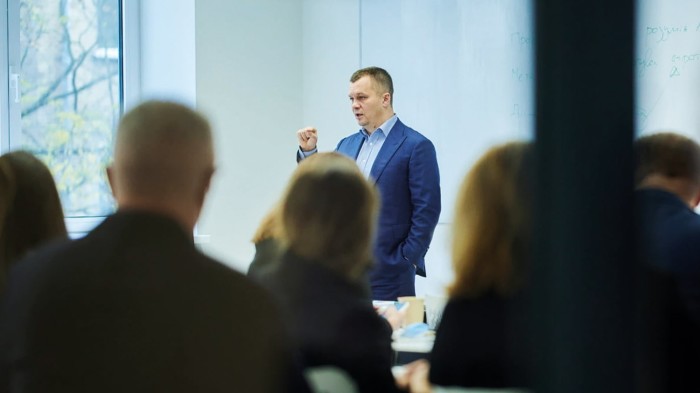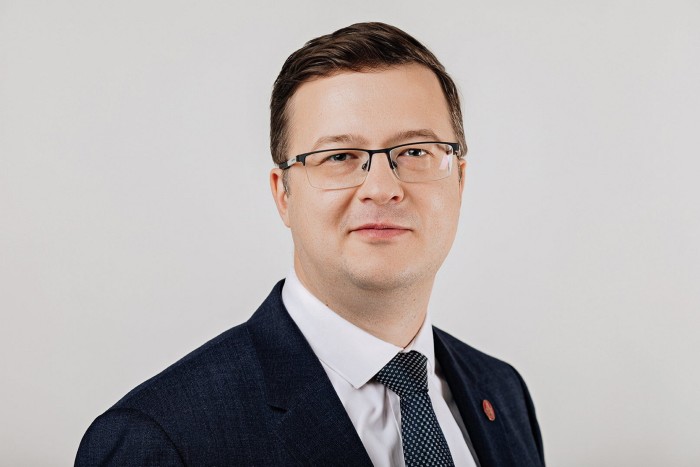A business school battles on in Kyiv

Roula Khalaf, Editor of the FT, selects her favourite stories in this weekly newsletter.
When Russian president Vladimir Putin launched his war against Ukraine a year ago, Tymofiy Mylovanov and Konstantin Krotov headed in opposite directions. The responses of the two academics reflect the divergent evolution of business schools and faculty on either side of the border.
Just before Russian troops advanced on the Ukrainian capital in late February last year, with international airlines already cancelling flights, Prof Mylovanov, president of the Kyiv School of Economics, hastily returned to his homeland from his other job as an associate professor at the University of Pittsburgh.
Prof Mylovanov resolved to stay in Ukraine and lead the Kyiv school, which he had helped rebuild from near-bankruptcy in 2016, despite the conflict, and to craft what he calls its distinctive “MBA on the frontline”.
“There are a lot of people who want to be in Ukraine,” says the professor, who is an economist and former Ukrainian minister of economic development, trade and agriculture. “I don’t know whether that’s rational or not, but we live here. It’s our country.”
Prof Krotov, then head of the Graduate School of Management (GSOM) at St Petersburg State University, went in the other direction as soon as Russia started a war he had not expected. “We decided on that first day, we had to leave,” he says. “We didn’t have any plan, offers or opportunities. We didn’t have money. But our strategy was to leave.” He flew with his family to Istanbul, where they stayed with friends and began the search for a new life.
Global MBA Ranking 2023

View the ranking here. Register for the February 22 Spotlight on MBA online event, and read the MBA report
He contacted Alice Guilhon, the dean at Skema Business School in France, who recruited him to the faculty. “I said, I don’t want to pay taxes to fund the war,” he explains. “I’m a quarter Ukrainian, my grandmother is from Luhansk, and I just can’t support it.”
In Kyiv, teachers from multiple institutions abroad are now helping support education from afar by offering online classes, while an increasing number of Prof Mylovanov’s own faculty are returning for in-person teaching.

Students — including some veterans who sustained injuries in the conflict — are also coming back to the Kyiv school. At Christmas, the students offered a “Secret Santa” service to the country’s displaced children. The institution has also fundraised for humanitarian programmes, providing bulletproof vests and medical kits, and supporting the retrofit of school basements as bomb shelters.
Teaching at the Kyiv school has also been updated, with a fresh focus on entrepreneurship, financing and operating during and after conflict. “We are seeing game theory being applied in reality, and the discussion of mentorship in human resources becomes very real, very quickly,” Prof Mylovanov says.
Meanwhile, GSOM in St Petersburg has turned inwards and eastward as its western students, faculty and contacts have dissipated. Prof Krotov says few at the school spoke out in favour of the war but, across Russia, “I was surprised how many people in other universities frankly supported it,” he says. “That became crystal clear. I realised I had made the correct decision [to leave].”
Like Prof Krotov, a number of Russian academics have fled, attended demonstrations, spoken out against the war and even faced imprisonment for opposition to the Putin regime. Others have been trapped, held back by the absence of visas, a lack of places to go, ways to support themselves or their obligations to dependants and family ties at home.
But many more who have stayed have offered at least passive support to the Kremlin, while their institutions have pledged allegiance and since found themselves rebuffed after two decades of forging connections with the west.
The big international accreditation bodies — AACSB, EFMD and AMBA — all suspended their Russian members. Stephanie Bryant, executive vice-president at the AACSB, says: “Schools in eastern and central Europe are so incredibly passionate about this. They want to express solidarity with Ukraine — if anything more so, now. It’s too egregious a situation not to stand in solidarity.”
“Russia was a very important partner, but our board decided to stop our collaboration,” says Danica Purg, head of IEDC-Bled School of Management in Slovenia and president of Ceeman, a network of schools in the region. “It is damaging in human terms. We were very connected with these people. You have schools which do not agree with Putin’s politics, but many which think he is right.”
A number of Ceeman members, as well as other schools and universities around the world, have offered short-term support for Russian and Ukrainian students, and academics, stranded abroad or seeking options to move away.
Yet such support is double-edged. Many staff have been forced to take temporary jobs far below their level of expertise and experience. Serhii Plokhii, a Ukrainian history professor long based at Harvard but deeply engaged in the current situation in his homeland, cautions that “refugee scholarships” for those who emigrate are neither sufficient nor focused on the greatest needs.
“Scholars in Ukraine, not outside of Ukraine, should become the focus of any academic support programme,” Prof Plokhii says, calling for ambitious international funding. “Many of them lost everything, with many universities in Kharkiv and Kyiv being bombed. Many lost homes either to the missiles or to the occupying Russian forces.”
Prof Mylovanov is also concerned that overseas universities, by offering positions for the best Ukrainian academics abroad, are contributing to a brain drain. “They are depleting our faculty pool,” he says. He hopes his peers will follow his example instead: “We have decided that this is our city. My heart is with the Kyiv School of Economics. I’m not sure it’s the most rational thing to do. But it is working out fine.”
Comments